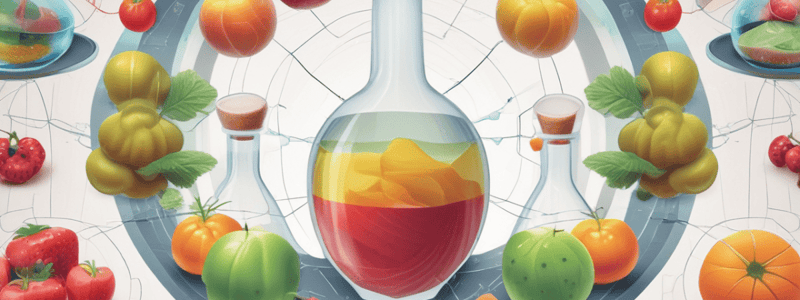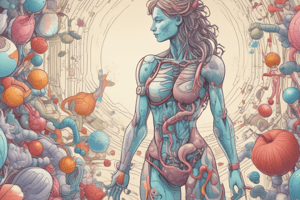Podcast
Questions and Answers
What is the study of the composition and characteristics of matter and the changes it can undergo?
What is the study of the composition and characteristics of matter and the changes it can undergo?
Chemistry
What is the term for the study of how the human body functions?
What is the term for the study of how the human body functions?
Human physiology
What are the raw materials that your cells need to survive and function?
What are the raw materials that your cells need to survive and function?
Nutrients and oxygen
What is the importance of learning the meaning of basic chemistry terms?
What is the importance of learning the meaning of basic chemistry terms?
What makes up food, air, water, rocks, and other forms of matter?
What makes up food, air, water, rocks, and other forms of matter?
What is the term for a complex collection of chemicals organized into cells?
What is the term for a complex collection of chemicals organized into cells?
Why do some people avoid eating foods that are not labeled organic?
Why do some people avoid eating foods that are not labeled organic?
What is the focus of Section 4.4 in the chapter?
What is the focus of Section 4.4 in the chapter?
What is a compound in the context of chemistry?
What is a compound in the context of chemistry?
What is a solution in chemistry?
What is a solution in chemistry?
What is the term for a substance that dissolves in a solvent?
What is the term for a substance that dissolves in a solvent?
What is the term for the ability of a substance to dissolve in a solvent?
What is the term for the ability of a substance to dissolve in a solvent?
What is an ion?
What is an ion?
What is an electrolyte?
What is an electrolyte?
What is the central region of an atom where protons are found?
What is the central region of an atom where protons are found?
What is the purpose of symbols in chemistry?
What is the purpose of symbols in chemistry?
What is an acid?
What is an acid?
What is the pH scale?
What is the pH scale?
What is the term for a substance that cannot be separated into simpler substances?
What is the term for a substance that cannot be separated into simpler substances?
What happens when atoms interact and form a chemical bond?
What happens when atoms interact and form a chemical bond?
What determines whether a substance is acidic or basic?
What determines whether a substance is acidic or basic?
What is the chemical formula for a water molecule?
What is the chemical formula for a water molecule?
What is an example of a solution with water as the solvent?
What is an example of a solution with water as the solvent?
How many carbon, hydrogen, and oxygen atoms are in a glucose molecule?
How many carbon, hydrogen, and oxygen atoms are in a glucose molecule?
What is unique about carbon atoms?
What is unique about carbon atoms?
What is the term for elements found in the Earth's crust that are essential for human health?
What is the term for elements found in the Earth's crust that are essential for human health?
What is the difference between essential and non-essential elements?
What is the difference between essential and non-essential elements?
What is an example of a molecule that contains different elements?
What is an example of a molecule that contains different elements?
What is the pH of a neutral solution, and what is the characteristic of such a solution?
What is the pH of a neutral solution, and what is the characteristic of such a solution?
How does the body maintain its acid-base balance, and what is the normal pH range of blood?
How does the body maintain its acid-base balance, and what is the normal pH range of blood?
What happens when an acid is added to an alkaline solution, and what is the resulting pH?
What happens when an acid is added to an alkaline solution, and what is the resulting pH?
What is the function of buffers in the blood, and how do they help maintain the body's acid-base balance?
What is the function of buffers in the blood, and how do they help maintain the body's acid-base balance?
How do the lungs and kidneys contribute to the body's acid-base balance?
How do the lungs and kidneys contribute to the body's acid-base balance?
What is anthocyanin, and what are its properties?
What is anthocyanin, and what are its properties?
What is a chemical reaction, and what happens to the elements involved?
What is a chemical reaction, and what happens to the elements involved?
What is the difference between synthetic and decomposition reactions?
What is the difference between synthetic and decomposition reactions?
What is the pH of black coffee, and how does it compare to the pH of tomatoes?
What is the pH of black coffee, and how does it compare to the pH of tomatoes?
What is the pH of a drain cleaner that contains sodium hydroxide, and how does it compare to egg white?
What is the pH of a drain cleaner that contains sodium hydroxide, and how does it compare to egg white?
What happens when vinegar (an acid) reacts with baking soda (a base)?
What happens when vinegar (an acid) reacts with baking soda (a base)?
What is the purpose of an acid ingredient in recipes that require baking soda?
What is the purpose of an acid ingredient in recipes that require baking soda?
What is the difference between catabolic and anabolic reactions?
What is the difference between catabolic and anabolic reactions?
What is the role of enzymes in chemical reactions?
What is the role of enzymes in chemical reactions?
What is unique about the names of most enzymes?
What is unique about the names of most enzymes?
Why can't you add fresh pineapple to a gelatin dessert?
Why can't you add fresh pineapple to a gelatin dessert?
What is a salt in the context of chemistry?
What is a salt in the context of chemistry?
What is the term for the sum of all chemical reactions that occur in living cells?
What is the term for the sum of all chemical reactions that occur in living cells?
What happens to enzymes when food is cooked?
What happens to enzymes when food is cooked?
What is the characteristic of enzymes that allows them to catalyze many reactions?
What is the characteristic of enzymes that allows them to catalyze many reactions?
Flashcards are hidden until you start studying
Study Notes
Chemistry Foundations
- Matter is composed of atoms that contain protons and electrons.
- Atoms have no electrical charge due to the equal number of protons and electrons.
- There are over 100 different types of atoms, each with its own element.
- Elements are the building blocks of matter and are essential for human nutrition.
- Examples of nutrition-related elements include Hydrogen (H), Oxygen (O), Carbon (C), Nitrogen (N), Calcium (Ca), and Iron (Fe).
Molecules and Compounds
- Molecules form when atoms interact and share electrons, forming a chemical bond.
- Chemical formulas represent the number and type of atoms in a molecule.
- Compounds are molecules that contain two or more different elements in specific proportions.
- Solutions are evenly distributed mixtures of two or more compounds, with water often being the solvent.
Ions
- Ions are atoms or groups of atoms that gain or lose electrons, resulting in an electrical charge.
- Ions can be positively charged (e.g., ammonium ion) or negatively charged (e.g., hydroxide ion).
- Electrolytes, such as sodium and potassium, are ions that conduct electricity and have important functions in the body.
Acids and Bases
- Acids are substances that lose H+ when dissolved in water.
- Bases are substances that remove and accept H+ when dissolved in water.
- pH measures the concentration of hydrogen ions in a solution, with a pH of 7 being neutral.
- The pH scale ranges from 0 to 14, with low values indicating high acidity and high values indicating high basicity.
Chemical Reactions
- Chemical reactions involve changes in the arrangement of atoms in molecules.
- Synthetic reactions combine elements or compounds to form new substances.
- Decomposition reactions break down molecules into smaller components.
- Enzymes are molecules (usually proteins) that catalyze specific chemical reactions.
Enzymes
- Enzymes speed up chemical reactions without becoming part of the products.
- Enzymes have specific actions and are sensitive to environmental conditions such as pH, temperature, and presence of vitamins and minerals.
- Examples of enzymes include sucrase, which breaks down sucrose into glucose and fructose.
Metabolism
- Metabolism refers to the sum of all chemical reactions that occur in living cells.
- Catabolic reactions involve breaking down molecules, while anabolic reactions involve synthesizing new compounds.
Studying That Suits You
Use AI to generate personalized quizzes and flashcards to suit your learning preferences.




